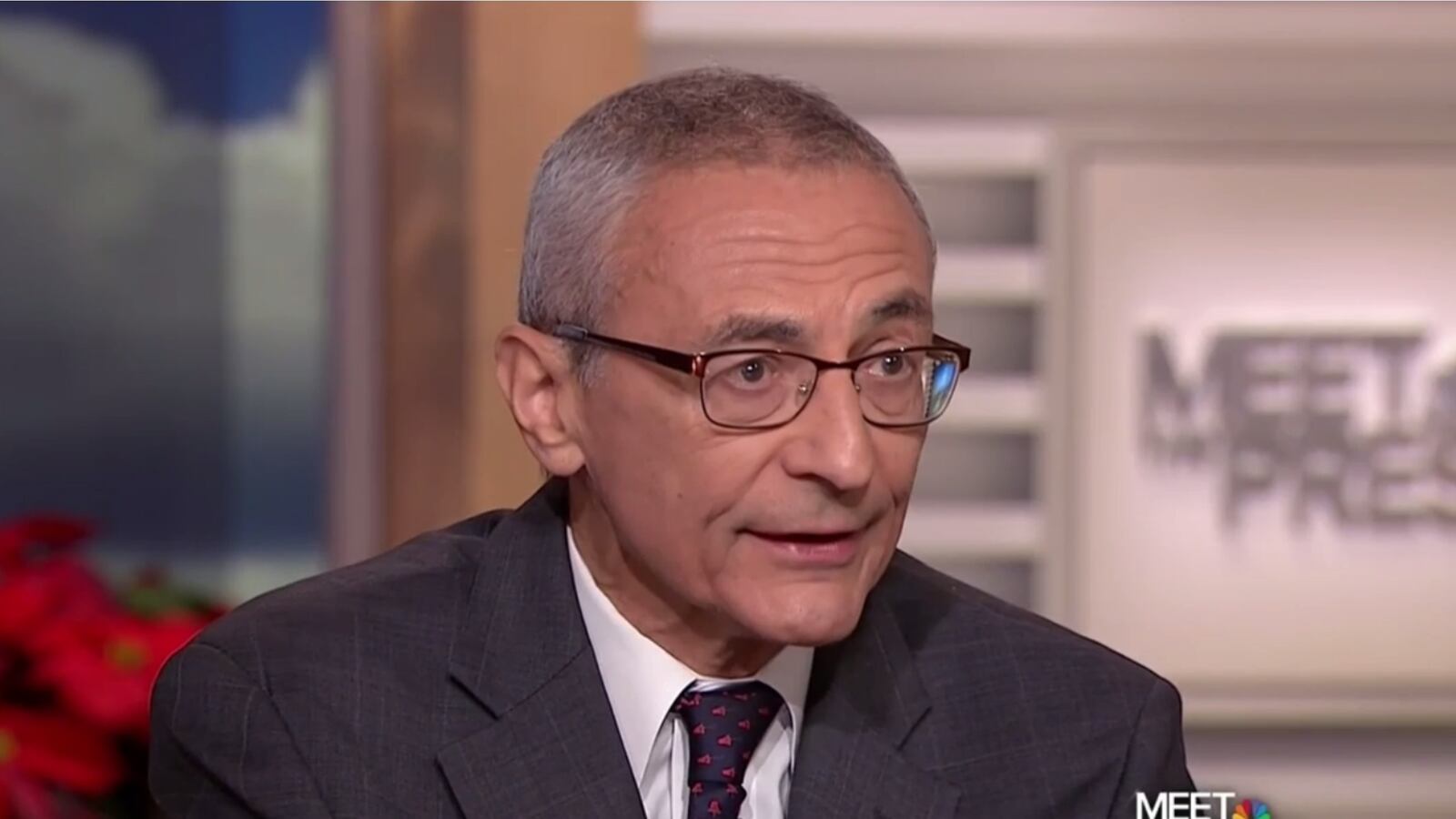John Podesta, Hillary Clinton’s campaign chairman, refused to say on Sunday that the 2016 presidential election was free and fair, citing Russian hacks into his personal email account and the Democratic National Committee as evidence that the outcome was “distorted.”
It came during a surreal hour of television on NBC’s Meet the Press, where Podesta twice refused to answer questions from host Chuck Todd about whether the election was legitimate. Then, a few minutes after Podesta’s interview concluded, former Secretary of Defense Robert Gates suggested that Podesta might have said just what the Russians wanted to hear: that the American electoral process is corrupt, and that the U.S. has no business telling other nations what it means to be a democracy.
Gates said the Russians intended for the hacks to communicate that American elections are “corrupt, incompetent, rigged, whatever and therefore no more honest than anybody else’s in the world including theirs.”
Podesta’s accusations of FBI malfeasance certainly fit with that theme. And it all indicates that scrutiny about the legitimacy of the 2016 election—at least from Clinton’s camp—may not dissipate anytime soon.
On MTP, Podesta also suggested that FBI Director James Comey gave more attention to Hillary Clinton’s use of a private email server than to the Russian hacks of the DNC and his own emails—reiterating an argument he made in a Washington Post op-ed published Dec. 15: that “something is deeply broken” at the FBI.
On CNN, though, Attorney General Loretta Lynch dismissed that suggestion and defended the FBI’s handling of the hacking probe, which is ongoing.
“I can tell you that this investigation was taken seriously from the beginning,” Lynch told CNN’s Jake Tapper on State of the Union. “This is an incredibly serious issue. I can’t comment on Mr. Podesta’s sources or where he gets his information, or why he has that view. But what I can say is that he’s not involved in the ongoing investigation so he wouldn’t be privy to everything that would have been done or said to that.”
Some Trump-allied Republicans have been quick to dismiss concerns over Russia’s influence on the race, suggesting that Democrats such as Podesta are acting like sore losers to cover for their flawed candidate and campaign strategy—and, in the process, trying to delegitimize Donald Trump’s Electoral College victory. On the left, Clinton critics make the same argument: that Clinton’s loss is her fault, and no one else’s.
“She blew it in Benghazi, she blew it with Russia, she blew it as secretary of state, she ignored the entire Midwest, and people didn’t like the product—that’s why Hillary Clinton lost,” Trump’s soon-to-be chief of staff Reince Priebus said on Fox News Sunday.
On Friday, President Obama hinted that Russia carried out the cyberattacks to help Trump, and he pleaded with Americans to “pay attention to what our intelligence agencies say” with regard to the country’s hacking. He also indicated that Russian President Vladimir Putin ordered—or at least signed off on—the cyberattacks.
The president-elect himself has denied that there is a consensus about Russia’s intent, even as The Washington Post reported on Friday that the FBI agrees with the CIA’s findings about Russia’s desire to influence the outcome of the election. Priebus said Trump would accept this conclusion only if intelligence officials from these agencies state publicly that there is broad agreement.
“I don’t think they’ve been clear about it. I think that it’s been all over the map,” Priebus said, adding that the embarrassing revelations from Podesta’s emails did not change the election’s outcome.
Others, like Arizona Sen. John McCain, accept the possibility that Russia acted in the name of propping up Trump. McCain has called for a joint congressional investigation into the Russian hacking, and on Sunday he attributed the cyberattacks to President Obama’s foreign policy.
“The president has no strategy and no policy as to what to do about these various cyberattacks that have possibly disrupted an American election,” the 2008 GOP presidential nominee said on CNN’s State of the Union.
“This is a sign of a possible unraveling of the world order that was established after World War II, which has made one of the most peaceful periods in the history of the world,” he added, attributing it to an “absolute failure of American leadership.”
McCain connected Obama’s shortcomings on Russia with other conflicts, namely the tragedy in Aleppo, Syria, and the ongoing civil war in that country.
“When America doesn’t lead, a lot of other bad people do,” he said.







